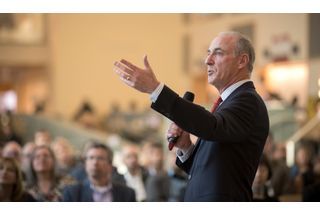Hotels thrive even in the age of Airbnb
By Susan Kelley for the Cornell Chronicle

Disruptors like Airbnb are forcing the hospitality industry to rethink its business models, a leading global hotel investment adviser said Oct. 6 at the Cornell Hospitality Research Summit. Those innovations, and shifting demographics and globalization, will help catalyze a "golden age" of travel in the next 25 years, he said.
"The future is very, very bright for lodging, hospitality and travel, not just short term but long term," said Arthur Adler '78, chair of the Americas division of Jones Lang LaSalle's Hotels & Hospitality Group.
Adler set the stage for the conference with a keynote speech on how disruption drives innovation in the hospitality industry.
The fourth annual summit took place Oct. 5-7 at Statler Hall. The School of Hotel Administration at the Cornell SC Johnson College of Business brought together industry representatives and academics to talk about research on opportunities in the era of disruption, with in-depth presentations from scholars and practitioners.
Disruptors shaking up the industry range from alternative accommodation websites such as HomeAway to new booking channels, competitive food and beverage businesses, and conference-space providers like WeWork, said Adler.
But the industry is adapting, thanks to the nimble thinking of a diverse new cadre of investors, said Adler. Private equity funds and real estate investment trusts own the bulk of hotel rooms, but institutional investors, sovereign wealth funds and high-net-worth individuals have become more prevalent.
"Owners with a profit motive and a value-enhancement motive are helping hotel companies think about what is the right model for their real estate," said Adler, who specializes in arranging hotel market transactions, financings, investment advisory services, asset management and consulting for domestic and offshore owners and investors. "That has been a healthy outside influence on these industries."
For example, new room products have entered the marketplace, such as extended stay, select-service hotels and lifestyle hotels, which offer amenities aimed at a specific demographic. As a result, the once-popular 400-room suburban full-service hotel with 25,000 to 30,000 square feet of meeting space is obsolete, Adler said. "The kind of hotels that were built in the 1980s, they're just not going to get developed anymore," he said.
Investors and owners are also nudging hotel operators to revamp food and beverage operations, which are generally unprofitable. Hotels are eliminating room service and offering grab-and-go options, or licensing pizza restaurants or coffee bars like Starbucks to operate in their hotels. And they're partnering with outside restaurants that deliver to their properties.
Other brands are going in the opposite direction. They're significantly enlivening the hotel's public spaces and creating a buzz with amenities like rooftop bars or common areas where people can work, read and collaborate, with 24/7 internet access and coffee service. "The property is not just a place to sleep; it becomes a destination in and of itself," Adler said.
And hotels are investing in technology and loyalty programs that drive customers to book rooms via the hotel's website. Their aim? To create incentives for customers to forego third-party booking channels like hotels.com, which take a 15 to 20 percent cut of the room rate, Adler said.
Disruption will continue to catalyze evolution. Strategies such as corporate entity spin-offs, mergers and acquisitions, and creating new brands have resonated well with the financial markets, he said. "Disruption forces you to adapt, get better, rethink your business model."
The next 25 years will be a "golden age" for lodging, travel and hospitality sectors, he predicted, thanks to several geopolitical and demographic trends.
Underlying this bright future is the inescapable fact that, unlike such businesses as retail, travel is not virtual, Adler said. "It's experiential. You can't stay in a hotel, go to a resort, go on a safari without actually going and doing it," he pointed out. "People value those experiences."
For example, aging baby boomers, who have discretionary time and income, are traveling more – not only alone but also with their extended families.
And as developing economies in China and India and other countries continue to expand, their middle classes will travel more, both domestically and internationally.
"That is going to grow much faster than the U.S. economy," Adler said. "When we think about U.S. travel, we often think provincially. But there are millions of people around the world who are going to come to the U.S."
About the Cornell Nolan School of Hotel Administration
The Cornell Peter and Stephanie Nolan School of Hotel Administration is the premier school for hospitality education in the world. As an integral part of the Cornell SC Johnson College of Business, the school is leading the world in teaching and researching the business of hospitality—marketing, finance, real estate, operations, and more, all applied to the world’s largest and most exciting industry. Top faculty, industry leaders, alumni, and students work together to generate new knowledge for the hospitality industry and form the premier network that shapes the industry every day.
